
JOHN WILLIAMS COMPOSER OF MUSIC FOR THE MOVIES:
BIOGRAPHY, PHOTOS, FILMOGRAPHY AND DISCOGRAPHY by D'Lynn Waldron,PhD ©2018
Grammies 2018 WINNER:
Arrangement, instrumental or a cappella:
"Escapades for Alto Saxophone and Orchestra From Catch Me If You Can"
John Williams, arranger (John Williams composer)
Upcoming Dudamel celebration of John Williams in the Disney
In the 2018-2019 LA Phil Season, Gustavo Dudamel will conduct a Celebration of John Williams in the Walt Disney Concert Hall with music from Fiddler on the Roof (1971), Jaws (1975), Star Wars (1977), E.T. (1982), Schindler’s List (1993), and many more, accompanied by montages from the films.
“John Williams has brought thrilling orchestral music into the lives of three generations around the world.”
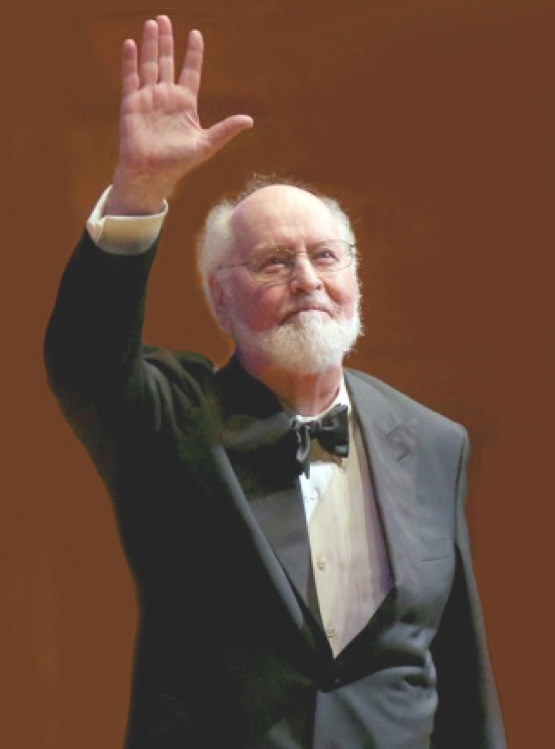
Dudamel Conducts John Williams Celebration in LA Phil Gala
GREAT PERFORMANCES VIDEO OF THE CONCERT BROADCAST ON JULY 24, 2015
GUSTAVO DUDAMEL INTERVIEWING JOHN WILLIAMS ON GREAT PERFORMANCES Text
PHOTO: John Williams composer with D'Lynn Waldron,PhD ©
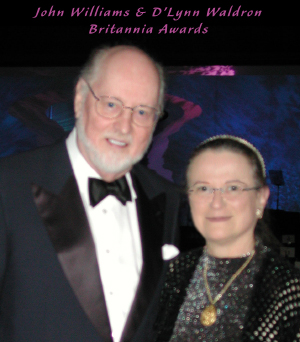
For a full slide show of the beautifulm expressive hands of John Williams conducting go to JWilliams03/index.html
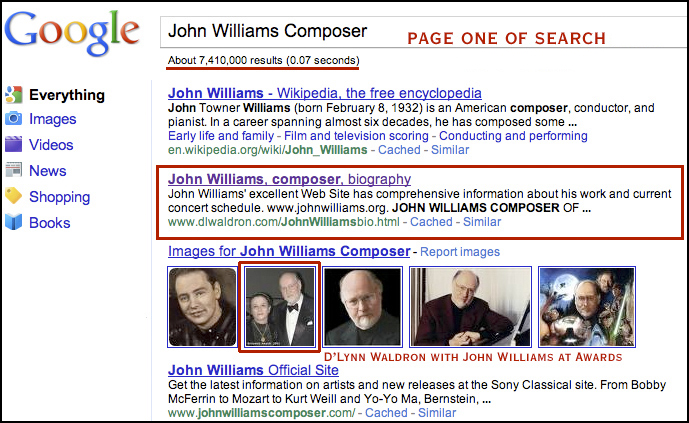
JOHN WILLIAMS BIOGRAPHY
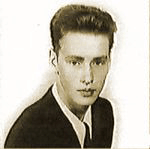
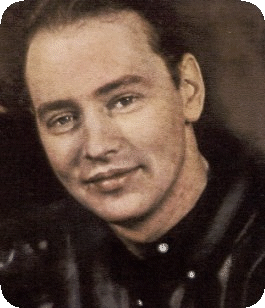 --
--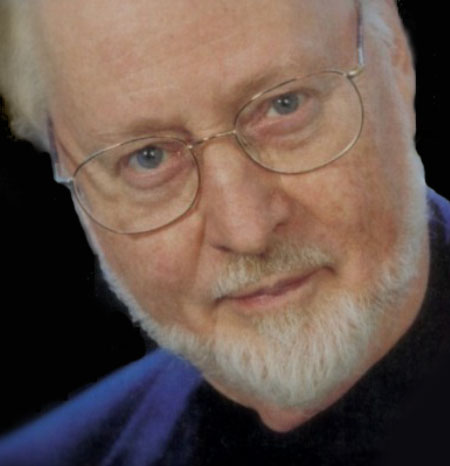
JOHN WILLIAMS, COMPOSER. b. 1932
CLICK FOR BIOGRAPHY
CLICK FOR FILMOGRAPHY
CLICK FOR AWARDS
CLICK FOR NEWS
CLICK FOR INTERVIEW TEXTS
CLICK FOR INTERVIEW AUDIOS & VIDEOS
News Through 2015
John Williams and David Newman will conduct The Boston Pops Esplanade Orchestra
John Williams' Film Night
August 22, 2015 Tanglewood.
Dudamel Conducts John Williams Celebration in LA Phil Gala 2015 Great Performances Video
John Williams has written the score for Jurassic World due for 2015 release.
John Williams is writing the score for Mobsters in the Mountains due tor 2015 release.
John Williams will be writing the score for the Episode VII of Star Wars. He has an interview on youtube about writing the Star Wars scores with photos from the archives of working on the legendary first movie.
John Williams conducted 'John Williams: Maestro of the Movies'
August 29 & 30, 2014 in the Hollywood Bowl.
In 2013, John Williams' score for The Book Thief was Oscar nominated, he conducted at the Capitol Fourth in Washington, and conducted John Williams, Maestro of the Movies in the Hollywood Bowl.
Through 2012, John Williams scored three Oscar nominsated films for Steven Spielberg, “The Adventures of Tintin: Secret of the Unicorn” and “War Horse” (2011) and “Lincoln" (2012).
John Williams interview on KUSC about the music for Lincoln 60 minutes
In addition to scoring three movies for Steven Spielberg, in the summer of 2011, John Williams conducted the Boston Pops at Tanglewood and the LA Phil in the Hollywood Bowl, and had the premier of “Quartet La Jolla,” a half-hour quartet for violin, cello, clarinet and harp commissioned for the 25th anniversary of Summerfest the La Jolla chamber music festival.
In 2003, when John Williams was the honoree at the Capitol Fourth, and our Santa Monica High School Marching Band opened that concert. The Santa Monica Schools have what may be the world's finest music education in a public school system: SMMARTS.info.
JOHN WILLIAMS ON WRITING FOR THE MOVIES
Condensed excerpts from a 2003 interview with Phillip Huscher published in full on the Chicago Symphony web site : www.cso.org/jwilliamsinterview.taf
My choice always is not to read scripts. I'd rather go into a projection room and look at a film to have that same pristine, unprepared reaction that the audience will have, however special effects (added later) complicate that process.
If I can see the film fairly close to its editorial rhythms, I'll get a sense of its kinetic ebb-and-flow; where the film may be slowing down, or where it's accelerating, and where I can pick up on the rhythms of the film. My own belief is that the first and most important issue in scoring films is tempo.
If the music is quicker than the editorial rhythm it may seem to slow the film down, and the reverse is also true. You need to get into the rhythmic "pocket." We know we've got it right when it's riding with the action in an effortless way.
(When composing) I'll run the scene several times and have a timing cue sheet that's been prepared for the scene, and then I'll write three or four bars and go back and look at it and then write four bars more and look at it again. And it's a constant process of writing, looking, checking, running it in my mind's ear against the film, even conducting with a stopwatch against the action of the film. It's driven almost measure by measure by the film itself.
The film (score) has to be conceived to be heard with the sound effects and the dialogue; we're writing accompaniment all the time.
In the late twenties and early thirties, people would come to Hollywood and their only idea to accompany film was inspired by the art music of Europe. Now we have something of the reverse in someone like John Adams, who finds inspiration not in the art music of Europe but in the media music, the urban racket of contemporary life. The exact opposite of what we had in the thirties-a complete shift in sensibility.
The process has really only begun. What the people coming along now are going to do will astound all of us, I know that. What's happened the last five or six decades has only been setting up a preparation, and a keen interest, and an awareness of the great musical opportunity that's here. It's an art form that's in its infancy. That's what's exciting.
Condensed excerpts from John Williams' interview by Phillip Huscher published in full on the Chicago Symphony web site: http://www.cso.org/jwilliamsinterview.taf
GUSTAVO DUDAMEL INTERVIEWING JOHN WILLIAMS ON GREAT PERFORMANCES Text
JOHN WILLIAMS BIOGRAPHY
John Towner Williams was born on Long Island, near New York City, on the 8th of February 1932 into a musical family. In 1948, the family relocated to Los Angeles, where he studied music at the UCLA, after which he did his national service in the Air Force.
Following the Air Force John Williams went to the Julliard School in New York, where he studied piano with Madame Rosina Lhevinne. While in New York, he also worked as a jazz pianist, both in clubs and on recordings as Johnny Williams.
In 1956, John Williams was hired by Twentieth Century Fox as a pianist in their studio orchestra, and he was soon also writing the music for TV shows such as Gilligan's Island, Lost in Space, Wagon Train and Land of the Giants and for low budget movies. At the studio Williams worked with the great movie composers Bernard Herrmann, Alfred Newman, and Franz Waxman.
In 1967, John Williams made the A List of movie composers when he wrote the Oscar-nominated score for The Valley of the Dolls.
John Williams has scored nearly 90 films and has been Oscar nominated over forty times. He has several times been nominated for more than one movie in a single year, as he was for both Munich and Memoirs of a Geisha.
John Williams’ themes for Star Wars, Indiana Jones, Superman, and ET have great appeal for the general public and his movie score albums are top sellers. John Williams’ compositions for the Olympic ceremonies capture the true spirit of the games. Williams composed the well-known NBC News theme The Mission.
From 1980 to 1993, along with all his other work, John Williams was the conductor and musical director of the famed and much loved Boston Pops Orchestra, where he is still a guest conductor. He is also Artist in Residence at Tanglewood.
As well as movie scores, John Williams has written concert pieces for such greats as cellist Yo-Yo Ma and each year Williams conducted at concerts all over the world.
John Williams' concert works include Seven for Luck for soprano and orchestra, a seven-piece song cycle based on the texts of former U.S. Poet Laureate Rita Dove.
In October 2003, John Williams helped inaugurate the Los Angeles Philharmonic's new Disney Hall conducting the world premiere of his new five-movement orchestral work, Soundings.
On December 5, 2004 John Williams was one of the 2004 honorees at the Kennedy Center in Washington, D.C.
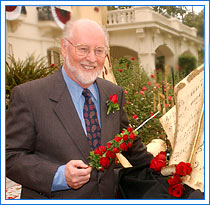
JOHN WILLIAMS AS GRAND MARSHALL OF THE 2004 ROSE PARADE
John Williams was the Grand Marshall of the 2004 Rose Parade which was seen around the world on New Year's Day. Maestro Williams wore a red baseball cap and rode in a classic red car. He had a big smile, a wave, and a thumbs-up for the cheering crowd of millions along the parade route, with a special acknowledgement for familiar faces who had come to see him, and the parade's theme Music.
In the Rose Bowl that afternoon, Maestro Williams led the massed bands in his own arrangement of the Star Spangled Banner.
JOHN WILLIAMS TRIBUTE AT THE CAPITOL FOURTH IN WASHINGTON, 2003
John Williams got a standing ovation that wouldn’t stop from the million people at the Capitol Fourth Celebration on the Washington Mall and East Lawn, July 4th, 2003.
The evening was a tribute to John Williams, and Eric Kunzel and the National Symphony Orchestra played Williams’ movie themes from Jaws, Indiana Jones, ET, Superman, Harry Potter and Star Wars. The Star Wars music got such an ovation it brought tears to Williams’ eyes.
After the medley, Williams was presented with the first National Artistic Achievement Award and then he conducted his own “Olympic Fanfare”.
Earlier in the evening, when Williams was sitting in the front row of the audience on the lawn, he took off his white dinner jacket to join the people around him in a swing-your-partners to the music of the Chieftains.
The featured school band was that of Santa Monica High School, the neighboring town to where John Williams lives. (And this writer's home town.)
(Photo.)
In 2004, John Williams was awarded an honorary doctorate by The Julliard.
Star Wars Becomes Stage Spectacular 2009
Star Wars: A Musical Journey, is a two hour stage spectacular that premiered at the O2 in London in April 2009, before touring Europe and going to the United States. The Royal Philharmonic's 86 piece orchestra played the music from the scores, with live narrators, and excerpts from the movies shown on a cinema screen.
The six Star Wars films were edited down to two hours and Williams "painstakingly rewrote" the original music from the movie scores.
The show was created by director George Lucas' company Lucasfilm and composer John Williams.
An exhibition of original models, props, costumes, and production artwork accompanied the tour.
JOHN WILLIAMS SCORE FOR MEMOIRS OF A GEISHA
by D'Lynn Waldron ©2006
For the first time in his career, John Williams asked to do a movie score, Memoirs of a Geisha directed by the brilliant Rob Marshall (Chicago).
At the age of 73, the most honored of composers, John Williams, wanted a challenge that would stretch his skills in to a new area- and he succeeded brilliantly!
He has created a marvelously textured score that defines and propels the story. He makes use of the traditional Japanese instruments, and also the monumental skills of violinist Itzhak Perlman and cellist Yo-yo Ma.
As he aspired to do, John Williams has brought a whole new dimension to his composing. This is a score that serves the movie's Japanese setting, therefore much of it will come as a surprise to John Williams' legion of fans, but they will also get beautiful themes for the violin and cello.
John Williams' score is complimented by marvelous work in sound design by John Pritchett and his team to create a unity of aural experience that is as important to the movie as the gorgeous cinematography.
John Williams Geisha score was nominated for the Oscar, as is his score for Munich, so again he is running against himself and could divide his own vote. Memoirs of a Geisha has also been deservedly nominated for both Sound Editing and Sound Mixing.
Note: As a voting member of the Music Chapter which decides the BAFTA awards, when the choice was difficult, my vote had to go to the score that best serves the movie. In 2002, my heart was with my friend Elmer Bernstein for his ravishingly beautiful Far From Heaven, and my intellectual admiration was with Eliott Goldenthal for Frida, but my vote had to go to Philip Glass for The Hours, because his score was absolutely essential to a successful movie. Glass's score held the episodic story together and gave it tension and forward movement. Without Glass's score, Nicole Kidman would not have gotten her best actress Oscar (and since then she seems to have favored scores reminiscent of it.)
JOHN WILLIAMS INTERVIEWS IN MP2 VIDEO CLIPS
JOHN WILLIAMS AWARDS SUMMARY (see lists below):
5 Oscars, 43 nominations (see below)
6 BAFTAs (British Academy)
4 Golden Globes, 19 nominations (see below)
17 Grammies, 47 Nominations
14 Honorary Degrees
JOHN WILLIAMS FILMOGRAPHY: Monsters in the Mountains (2015), Jurassic World (2015), Lincoln (2012), War Horse (2011), Adventures of Tintin (2011), Indiana Jones and the Kingdom of the Crystal Skull (2008), Munich (2005), Memoirs of a Geisha (2005), Munich (2005), War of the Worlds (2005), Revenge of the Sith (2005), The Terminal (2004), Harry Potter and the Prisoner of Azkaban (2003), Catch Me If You Can (2002), Harry Potter and the Chamber of Secrets (2002), Minority Report (2002), Star Wars Episode II: Attack of the Clones (2002), A.I. Artificial Intelligence (2001), Harry Potter and the Sorcerer's Stone (2001), Jurassic Park III (2001), The Patriot (2000), Angela's Ashes (1999), Star Wars Episode I: The Phantom Menace (1999), Saving Private Ryan (1998), Stepmom (1998), Amistad (1997), The Lost World: Jurassic Park (1997), Rosewood (1997), Seven Years in Tibet (1997), Sleepers (1996), Nixon (1995), Sabrina (1995), Jurassic Park (1993), Schindler's List (1993), Far and Away (1992), Home Alone 2: Lost in New York (1992), Hook (1991), JFK (1991), Home Alone (1990), Presumed Innocent (1990), Stanley & Iris (1990), Always (1989), Born on the Fourth of July (1989), Indiana Jones and the Last Crusade (1989), The Accidental Tourist (1988), Empire of the Sun (1987), Superman IV: The Quest for Peace (1987), The Witches of Eastwick (1987), SpaceCamp (1986), Jaws IV: The Revenge (1985), Indiana Jones and the Temple of Doom (1984), The River (1984), Return of the Jedi (1983), Superman III (1983), Aliens From Another Planet (1982), E.T. the Extra-Terrestrial (1982), Monsignor (1982), Yes, Giorgio (1982), Heartbeeps (1981), Raiders of the Lost Ark (1981), The Empire Strikes Back (1980), Superman II (1980), 1941 (1979), Dracula (1979), The Fury (1978), Jaws 2 (1978), Superman (1978), Black Sunday (1977), Close Encounters of the Third Kind (1977), Star Wars (1977), Family Plot (1976), Midway (1976), The Missouri Breaks (1976), The Eiger Sanction (1975), Jaws (1975), Conrack (1974), Earthquake (1974), The Sugarland Express (1974), The Towering Inferno (1974), Cinderella Liberty (1973), The Long Goodbye (1973), The Man Who Loved Cat Dancing (1973), The Paper Chase (1973), Tom Sawyer (1973), The Cowboys (1972), Images (1972), Pete 'n' Tillie (1972), The Poseidon Adventure (1972), Fiddler on the Roof (1971), The Screaming Woman (1971), Jane Eyre (1970), Story of a Woman (1970), Daddy's Gone A-Hunting (1969), Goodbye, Mr. Chips (1969), The Reivers (1969), Heidi (1968), Sergeant Ryker (1968), Fitzwilly (1967), A Guide for the Married Man (1967), Valley of the Dolls (1967), How to Steal a Million (1966), Not with My Wife, You Don't (1966), Penelope (1966), The Plainsman (1966), The Rare Breed (1966), John Goldfarb, Please Come Home (1965), None But the Brave (1965), The Killers (1964), Nightmare in Chicago (1964), Gidget Goes to Rome (1963), Diamond Head (1962), Flashing Spikes (1962), Bachelor Flat, The Secret Ways (1961), Stark Fear (1961), Because They're Young (1960), I Passed for White (1960), Daddy-O (1959)
Television Films: Hollywood in Vienna (2011), Heidi (November 17, 1968), Jane Eyre (March 24, 1971), The Screaming Woman (January 29, 1972), The Unfinished Journey (December 31, 1999)
JOHN WILLIAMS AWARDS
ACADEMY AWARDS
1994 Academy Awards - Winner, Best Original Score - Schindler's List
1982 Academy Awards - Winner, Best Original Score - E.T. The Extra-Terrestrial
1977 Academy Awards - Winner, Best Original Score - Star Wars
1975 Academy Awards - Winner, Best Original Score - Jaws
1972 Academy Awards - Winner, Best Original Song Score and/or Adaptation - Fiddler on the Roof
2012 Academy Awards - Nominee, Best Original Score - Lincoln
2011 Academy Awards - Nominee, Best Original Score - War Horse
2011 Academy Awards - Nominee, Best Original Score - Adventures of Tintin
2005 Academy Awards - Nominee, Best Original Score - Memoirs of a Geisha
2005 Academy Awards - Nominee, Best Original Score - Munich
2001 Academy Awards - Nominee, Best Original Score - Harry Potter and the Sorcerer's Stone
2000 Academy Awards - Nominee, Best Original Score - The Patriot
1999 Academy Awards - Nominee, Best Original Score - Angela's Ashes
1998 Academy Awards - Nominee, Best Original Dramatic Score - Saving Private Ryan
1997 Academy Awards - Nominee, Best Original Dramatic Score - Amistad
1996 Academy Awards - Nominee, Best Original Dramatic Score - Sleepers
1995 Academy Awards - Nominee, Best Original Dramatic Score - Nixon
1995 Academy Awards - Nominee, Best Original Comedy/Musical Score - Sabrina
1995 Academy Awards - Nominee, Best Original Song - "Moonlight" from Sabrina
1991 Academy Awards - Nominee, Best Original Song - "When You're Alone" from Hook
1991 Academy Awards - Nominee, Best Original Score - JFK
1990 Academy Awards - Nominee, Best Original Score - Home Alone
1990 Academy Awards - Nominee, Best Original Song - "Somewhere In My Memory" from Home Alone
1989 Academy Awards - Nominee, Best Original Score - Born on the Fourth of July
1989 Academy Awards - Nominee, Best Original Score - Indiana Jones and the Last Crusade
1988 Academy Awards - Nominee, Best Original Score - The Accidental Tourist
1987 Academy Awards - Nominee, Best Original Score - Empire of the Sun
1987 Academy Awards - Nominee, Best Original Score - The Witches of Eastwick
1984 Academy Awards - Nominee, Best Original Score - Indiana Jones and the Temple of Doom
1984 Academy Awards - Nominee, Best Original Score - The River
1983 Academy Awards - Nominee, Best Original Score - Return of the Jedi
1982 Academy Awards - Nominee, Best Original Song - "If We Were In Love" from Yes, Giorgio
1981 Academy Awards - Nominee, Best Original Score - Raiders of the Lost Ark
1980 Academy Awards - Nominee, Best Original Score - The Empire Strikes Back
1978 Academy Awards - Nominee, Best Original Score - Superman
1977 Academy Awards - Nominee, Best Original Score - Close Encounters of the Third Kind
1974 Academy Awards - Nominee, Best Original Dramatic Score - The Towering Inferno
1973 Academy Awards - Nominee, Best Original Dramatic Score - Cinderella Liberty
1973 Academy Awards - Nominee, Best Original Song Score and/or Adaptation - Tom Sawyer
1973 Academy Awards - Nominee, Best Original Song - "Nice To Be Around" from Cinderella Liberty
1972 Academy Awards - Nominee, Best Original Dramatic Score - Images
1972 Academy Awards - Nominee, Best Original Dramatic Score - The Poseidon Adventure
1969 Academy Awards - Nominee, Best Original Dramatic Score - The Reivers
1969 Academy Awards - Nominee, Best Original Musical Score - Goodbye Mr. Chips
1967 Academy Awards - Nominee, Best Original Score, Adaption or Treatment - Valley of the Dolls
GOLDEN GLOBES
2011 Golden Globes - Winner, Best Original Score - War Horse
2005 Golden Globes - Winner, Best Original Score - Memoirs of a Geisha
1982 Golden Globes - Winner, Best Original Score - E.T. The Extra-Terrestrial
1977 Golden Globes - Winner, Best Original Score - Star Wars
1975 Golden Globes - Winner, Best Original Score - Jaws
2001 Golden Globes - Nominee, Best Original Score - A.I. Artificial Intelligence
1999 Golden Globes - Nominee, Best Original Score - Angela's Ashes
1998 Golden Globes - Nominee, Best Original Score - Saving Private Ryan
1997 Golden Globes - Nominee, Best Original Score - Seven Years in Tibet
1994 Golden Globes - Nominee, Best Original Score - Schindler's List
1989 Golden Globes - Nominee, Best Original Score - Born on the Fourth of July
1988 Golden Globes - Nominee, Best Original Score - The Accidental Tourist
1987 Golden Globes - Nominee, Best Original Score - Empire of the Sun
1984 Golden Globes - Nominee, Best Original Score - The River
1978 Golden Globes - Nominee, Best Original Score - Superman
1977 Golden Globes - Nominee, Best Original Score - Close Encounters of the Third Kind
1974 Golden Globes - Nominee, Best Original Score - Earthquake
1973 Golden Globes - Nominee, Best Original Score - Cinderella Liberty
1973 Golden Globes - Nominee, Best Original Score - Tom Sawyer
BRITISH ACADEMY OF FILM AND TELEVISION ARTS (BAFTA)
2011 BAFTA - Winner, Best Film Music - War Horse
2005 BAFTA - Winner, Best Film Music - Memoirs of a Geisha
2002 BAFTA - Winner, Best Film Music - Catch Me If You Can
1998 BAFTA - Winner, Best Film Music - Savingg Private Ryan
1988 BAFTA - Winner, Best Film Music - Empire of the Sun
1982 BAFTA - Winner, Best Film Music - E.T. The Extra-terrestrial
1981 BAFTA - Winner, Best Film Music - Raiders of the Lost Ark
1980 BAFTA - Winner, Best Film Music - The Empire Strikes Back
1978 BAFTA - Winner, Best Film Music - Star Wars & Close Encounters
1975 BAFTA - Winner, Best Film Music - Jaws
http://www.johnwilliams.org
JOHN WILLIAMS INTERVIEWS IN MP2 VIDEO CLIPS
John Williams with Julie Andrews - Hollywood Bowl, 2013

![]()




 --
--

